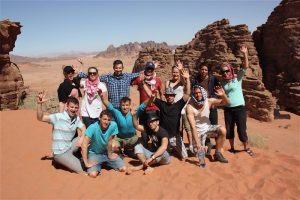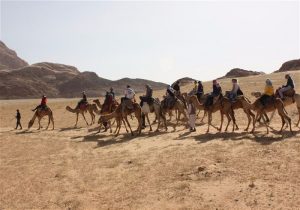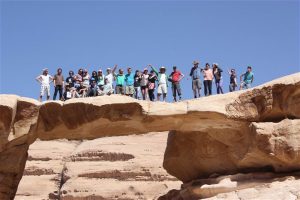 I was privileged this year to spend Easter week in the majestic Wadi-Rum desert in Jordan together with 30 participants and leaders in the BridgeBuilders program. Our focus was on our unity in Messiah, bridge building and reconciliation – very appropriate themes for Easter. Two thousand years ago God reconciled the world to himself through Jesus’ death and resurrection. This is the wonderful message we are to proclaim to the world, and on the basis of our restored relationship to our heavenly Father we are called to be reconciled to our neighbors.
I was privileged this year to spend Easter week in the majestic Wadi-Rum desert in Jordan together with 30 participants and leaders in the BridgeBuilders program. Our focus was on our unity in Messiah, bridge building and reconciliation – very appropriate themes for Easter. Two thousand years ago God reconciled the world to himself through Jesus’ death and resurrection. This is the wonderful message we are to proclaim to the world, and on the basis of our restored relationship to our heavenly Father we are called to be reconciled to our neighbors.
This was the second part of the two-part BridgeBuilders conference, where young Messianic Jews, Palestinian Christians, and Christian Norwegians gathered to build friendships, learn about one another’s history and culture, and strengthen the bonds of fellowship we have as followers of our Lord Jesus. When the group met in Norway last August, a foundation was laid which made it possible to share and to listen to one another, to be open and honest. And although the discussions could get quite heated at times, mutual respect and love made it possible to share even the most painful experiences.
Since part one of the program, the participants have taken the initiative to meet both inside and outside the BridgeBuilders program framework, despite the challenging circumstances. Even during the Gaza war in November 2012, participants from both sides of the conflict kept in touch and prayed for one another.
 In the second half of the program, the unity and relationships were tested once more as we sought to bring the group into deeper issues, mainly the topic of identity. Though identity is a part of each of our lives, we sometimes place the aspects of our identity which may be different from that of the “other” in the background when we are seeking to reconcile. We may feel that it is best to focus on what we have in common in order to create a conversation with the fewest barriers. In this case, our shared identity as followers of Jesus is the very foundation that the program builds on. And so the challenge is to find a balance where our shared identity is central to all we do, but at the same time open up to explore the elements of our individual identities which make us different. At one point, as we were dealing with these issues, the discussion became so heated that we wondered
In the second half of the program, the unity and relationships were tested once more as we sought to bring the group into deeper issues, mainly the topic of identity. Though identity is a part of each of our lives, we sometimes place the aspects of our identity which may be different from that of the “other” in the background when we are seeking to reconcile. We may feel that it is best to focus on what we have in common in order to create a conversation with the fewest barriers. In this case, our shared identity as followers of Jesus is the very foundation that the program builds on. And so the challenge is to find a balance where our shared identity is central to all we do, but at the same time open up to explore the elements of our individual identities which make us different. At one point, as we were dealing with these issues, the discussion became so heated that we wondered  whether the bridges that had been built would collapse – but the opposite happened. The participants opened up even more, sharing their pain and frustration, and the relationships were strengthened. The unity we have in Christ does not blot out every difference or disagreement, but it makes it possible to be united in a common bond of love for each other and in a common purpose: to proclaim the love of Christ which can break down every human barrier that may exist. I have no doubt that the participants returned home with a changed heart and a renewed commitment to continue to strengthen the bonds of fellowship in spite of the difficult circumstances.
whether the bridges that had been built would collapse – but the opposite happened. The participants opened up even more, sharing their pain and frustration, and the relationships were strengthened. The unity we have in Christ does not blot out every difference or disagreement, but it makes it possible to be united in a common bond of love for each other and in a common purpose: to proclaim the love of Christ which can break down every human barrier that may exist. I have no doubt that the participants returned home with a changed heart and a renewed commitment to continue to strengthen the bonds of fellowship in spite of the difficult circumstances.
On the last evening, we all shared communion under the stars in the quiet desert. As we did this, we sang, “In Christ alone my hope is found, he is my light, my strength, my song.” At the end of the day this is what BridgeBuilders is about: our hope for true peace, which Jesus made possible on the cross. We believe that our Lord is calling us as one body to proclaim his death and resurrection and to be light and salt in this world. In this way we can bring about change that is so needed in our societies.
One of the Palestinian participants was asked toward the end of the conference whether she thought she would be able to stay in touch with her Israeli friends. She replied, “Of course! This is not the end, it is only the beginning.”